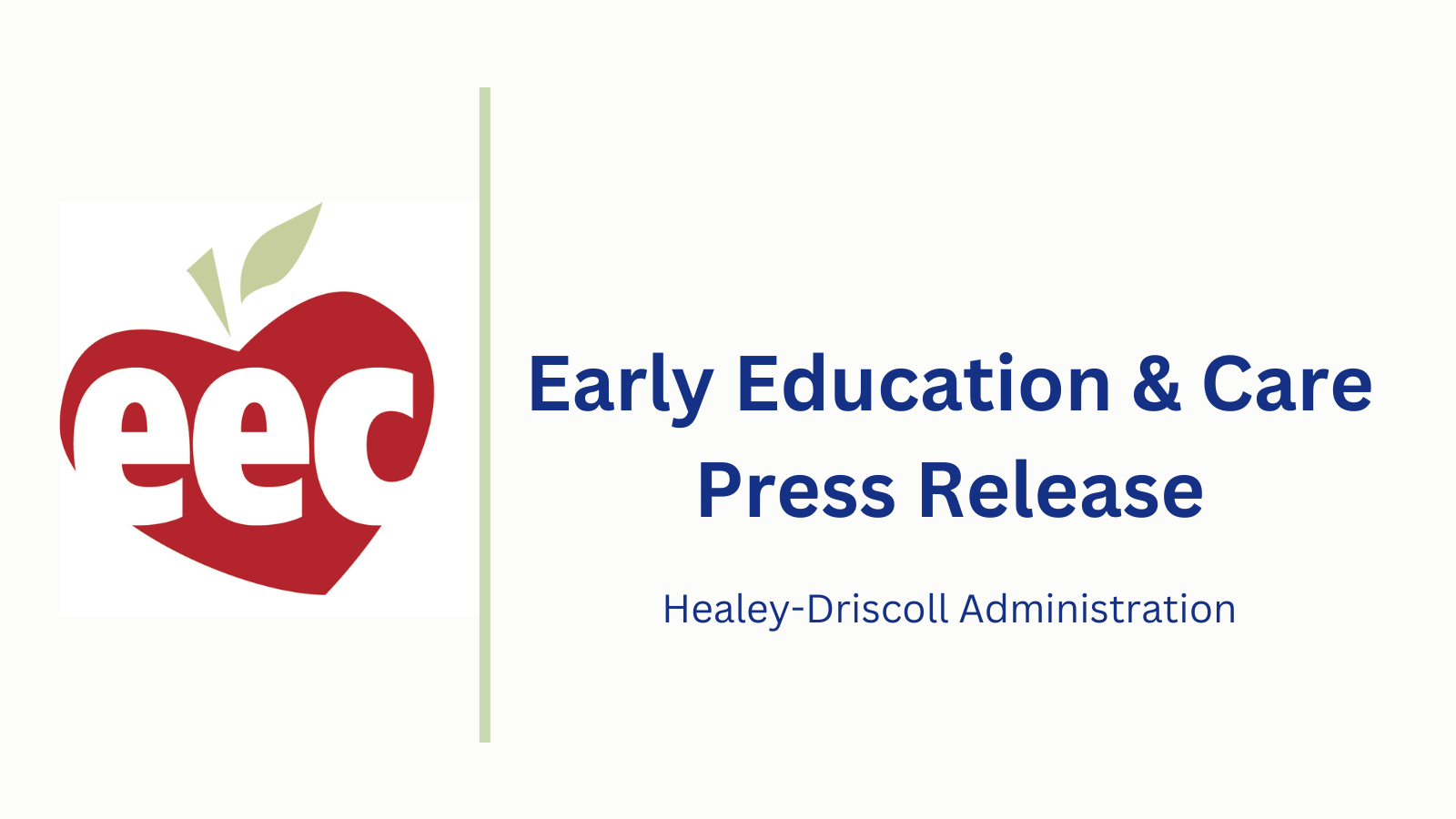- Department of Early Education and Care
- Executive Office of Education
Media Contact
Alana Davidson, Director of Communications

Boston — The Healey-Driscoll Administration has announced that today the Department of Early Education and Care (EEC) proposed transformative changes to how much the state reimburses early education and care providers who accept child care financial assistance, known as rates, to the Board of Early Education and Care. These proposed changes would invest $65 million from the state’s fiscal year 2024 budget to set Massachusetts up to make significant progress on covering the true cost of care, make sure that providers are being paid a fair rate regardless of where they are located, and address rising operational costs for programs.
“One of the top priorities of our administration is making child care more affordable and accessible. These proposed rate changes build on the significant reforms to child care financial assistance regulations and policies we launched earlier this fall, increasing affordability and equity for our low-income families and early education providers,” said Governor Maura Healey. “We’re proud that Massachusetts can lead the way in setting rates that better reflect the cost of care so our providers can invest in their educators and programming, and we can reduce child care costs for families.”
“In Massachusetts, we are investing in child care so that regardless of zip code or economic background, our youngest learners can access the high-quality education they need to succeed in school and life. Setting equitable rates for our early education and care providers that better reflect the cost of providing care is an essential part of this work,” said Lieutenant Governor Kim Driscoll. “I am excited to see more about the impact these transformative proposed changes could bring to our state, making Massachusetts a more affordable place to live, learn and work.”
EEC reimburses providers of child care and out-of-school time programs that serve families receiving child care financial assistance with a daily per child reimbursement rate. These rates provide direct needs-based financial assistance to increase families’ purchasing power in the market and help pay for the cost of care. The proposed transformational rates package includes three key elements:
- Provides a 5.5 percent cost of living adjustment to rates for all child care financial assistance providers to address increasing operational costs,
- Consolidates the agency’s rate structure to three rates using the cost of care in addition to a market rate survey so rates can reflect the cost of providing care rather than how much parents can pay for care, as well as the local market for tuition, and
- Raises center-based program rates to at least 81% of the cost of care for rates not already at or above the 80 percent level.
Simplifying the rate structure provides more equitable rate amounts across geographic location and age group of children served. Western Massachusetts has historically had lower rate levels compared to other regions relative to the cost of care. EEC’s proposed rate package will bring Western Massachusetts to the same daily reimbursement rate as other regions with similar costs. This would significantly increase the daily rate for center-based providers in Western MA cities and towns by 34 percent for infants, 14 percent for toddlers and 13 percent for preschools relative to FY23.
“Our administration believes that expanding access to more affordable, high-quality early education and care is the first step to ensuring every Bay State child has access to the education they deserve, regardless of their circumstances or background,” said Secretary of Education Patrick Tutwiler. “Here in Massachusetts, we don’t just want to get ‘back’ to how things were before the pandemic—these proposed rate changes will help transform our state’s child care financial assistance system to be the child care financial assistance system that our students, families and early education and care providers deserve.”
“We are committed to making our child care financial assistance programs in Massachusetts family focused, accessible, dignified and equitable. The Administration is continuing that work by proposing transformative changes to our child care financial assistance rates,” said Early Education and Care Commissioner Amy Kershaw. “By changing our rates to better reflect the cost of care, with an intentional focus on equity, we are enabling our providers to better recruit and retain their staff and invest in high-quality initiatives without transferring those costs onto families.”
Under EEC’s proposal, Massachusetts would be one of the first states to use the cost of care as an additional metric beyond the federally required market rate when setting child care financial assistance rates. There is growing recognition nationally that a market rate survey alone is not the best metric to use to set rates, as the price of care is often more reflective of how much parents are able to pay for care and the local market for tuition versus the cost of providing high quality care. Last year, EEC contracted with the Center for Early Learning Funding Equity to understand the extent to which the state’s rates cover the cost of care and ways the agency could simplify the rate regional structure. This analysis informed the agency’s transformational proposal this year.
The full list of proposed rates can be found online. The Board of Early Education and Care will vote on this proposal in January 2024.
The Administration previously announced significant improvements to the state’s Child Care Financial Assistance programs in October. This included updated regulations and policies to simplify the application process for parents, reduce paperwork for families and early education programs, and better support homeless families, families with disabilities and families facing domestic violence. Together these changes that make it easier for programs to administer child care financial assistance and proposed increased rates aim to attract more providers to participate in the state’s child care financial assistance system, expanding options and access for families.
###
